It can feel like nutrition is a new religion, and the internet is full of claims about how what we eat (or don’t eat) can influence our health and performance. Should we be feasting, fasting or both? Go vegan, carnivore or keto? It can feel challenging to separate the signal from the noise, particularly in the context of nutrition and cognitive performance.
In this article, I’ll share an overview of some of the research on two aspects of this topic: 1) nutrients and cognitive performance and 2) particular diets and cognitive performance. I’ll also provide some ideas for how to consider the claims that you are likely to encounter, and offer some practical, evidence-based tips to eat for brain health and performance.
When I was growing up, I was advised never to discuss politics or religion at the dinner table. For the most part, I ignored that advice, and have enjoyed many engaging and interesting conversations as a result. However, I’ve also witnessed how these subjects can provoke deep emotions and strong feelings.
If I was to share a word of caution with a younger person today, I would probably add ‘dietary choice’ to the list. Discussions around particular dietary approaches can reach an extreme level. Partly for this reason, I’ve avoided weighing into any debates about diet. However, almost every time I present on the theme of cognitive performance, I receive questions about the role of nutrition, often inspired by popular articles or posts about one food, or a particular approach to eating, being proposed as a way to ‘upgrade your brain’.
What Are You Trying To Achieve, & When?
Before delving into the topic of nutrition and cognitive performance, specifically, it’s important to ask the following two questions:
- Are you trying to maintain healthy levels of cognitive function, or achieve supra-normal levels?
- Over what time scale are you hoping to enjoy these benefits?
Claims are often made that suggest that a particular intervention could provide an immediate boost to cognitive performance – making you feel sharper and more focused in an afternoon meeting, for example.
Can Nuts Boost Your Brain Function?
In 2019, a popular UK newspaper shared its interpretation of an observational study, published in the Journal of Nutrition Health and Aging1. The researchers tracked the diets of 4822 Chinese adults aged 55 or older, for nine years, and discovered an inverse relationship between nut consumption and cognitive decline. People who ate more than 10g of nuts and seeds per day appeared to be less likely to exhibit a decline in cognitive function relative to people who consumed less than 10g a day. Basically, eat more nuts, cognitive performance seems to decline less.
67% of the participants had their cognitive ability tested twice during the nine-year tracking period. The change in cognitive performance in this portion of the group was examined, resulting in the finding that a nut intake of more than 10g/d was associated with performing 0.63 points higher, relative to the ‘low nut’ participants. However, no claims were made about any immediate boosts to cognitive performance. The study design and analysis also means that it’s impossible to make any individual-level claims. Not that is stopped the headline writers reporting that eating just two teaspoons of nuts a day “boosts brain function by 60%”.
The Distinction Between Immediate & Long-Term Benefits
While some interventions may offer an immediate benefit, it’s essential to highlight the distinction between something that results in an immediate increase in cognitive performance and something that helps to maintain or slow decline, over an extended period. Both could claim to improve cognitive performance, but the outcomes are different.
Our ageing populations have made the prevalence and devastating impact of neurodegenerative conditions, such as age-related cognitive impairment and dementia, more apparent. A substantial amount of the available evidence concerning cognitive performance relates to maintaining healthy brain function, particularly concerning focus, attention and memory, for as long as possible, rather than interventions that could provide an immediate benefit.
Similarly, much of the evidence concerning nutrition and cognitive performance relates to either healthy development (ensuring babies and children receive the nutrients they need to grow and develop normally), or healthy ageing, where it’s clear that nutrition can play a role in maintaining healthy cognitive function and even slowing decline.
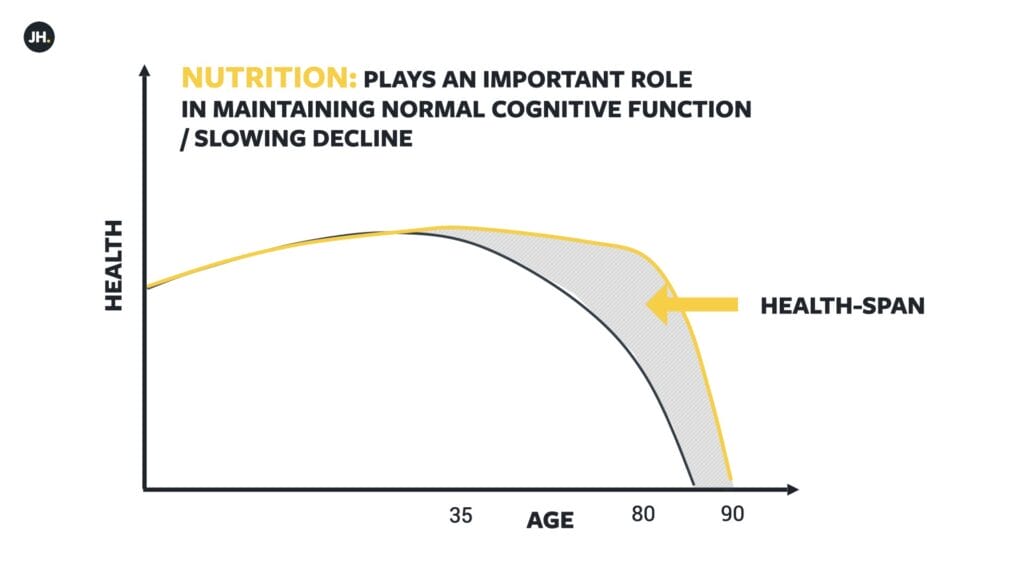
Approved Health Claims & Cognition
The following tables provide a summary of approved health claims for nutrients concerning cognition and some examples of where you can find these nutrients.
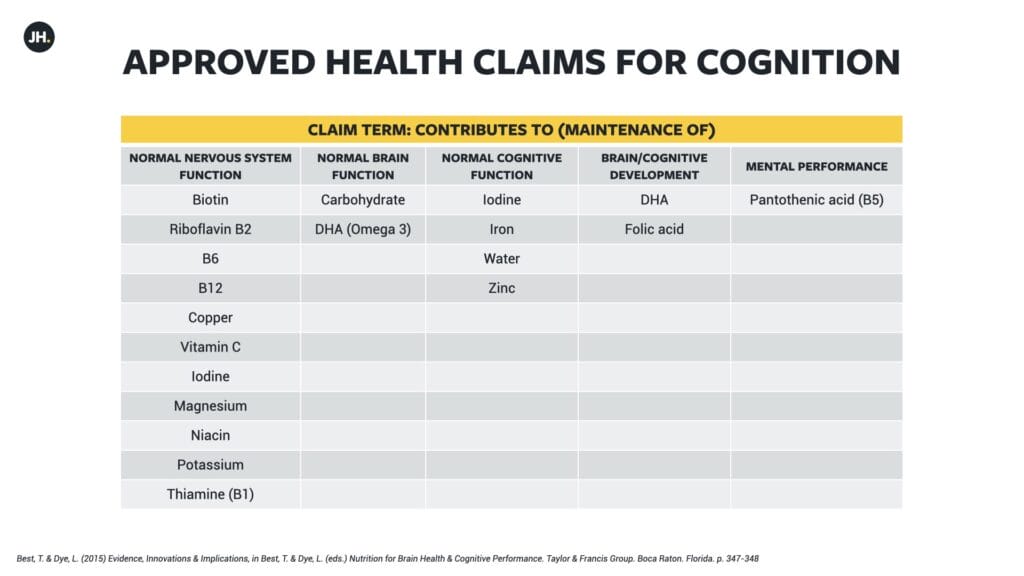
Where can you find these nutrients?
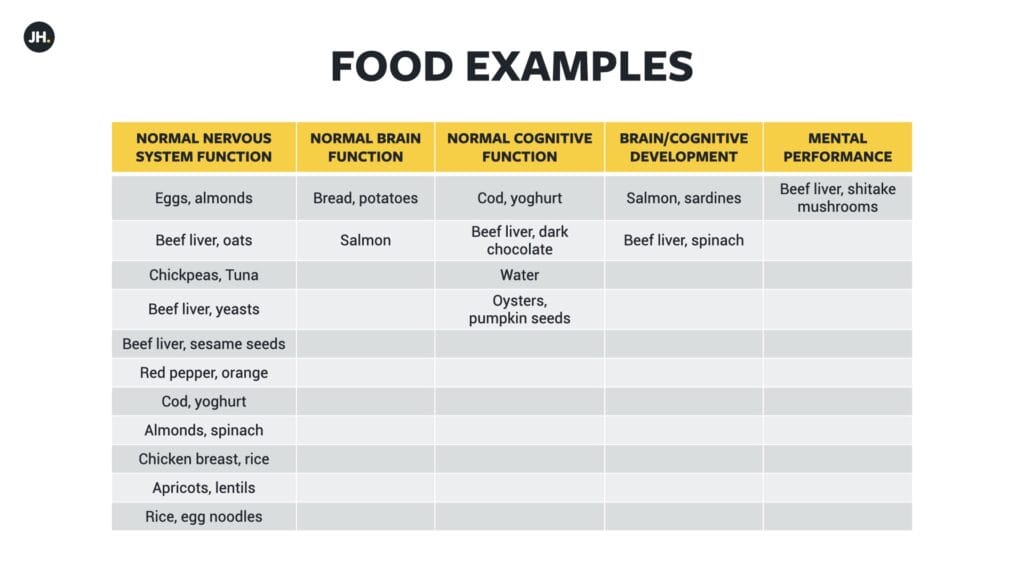
Ceiling Effects – More Does Not Necessarily Mean Better
A ceiling effect can describe how increasing the dose of a drug, beyond a certain point, does not increase effectiveness. The same effect can be observed with many nutrients and cognitive performance. Providing an individual is consuming an adequate amount of these nutrients, more does not necessarily mean better. Unfortunately, eating super-food salad for lunch unlikely to elevate me to genius-level contributions at the afternoon round-table, no matter how many goji berries I pour over it.
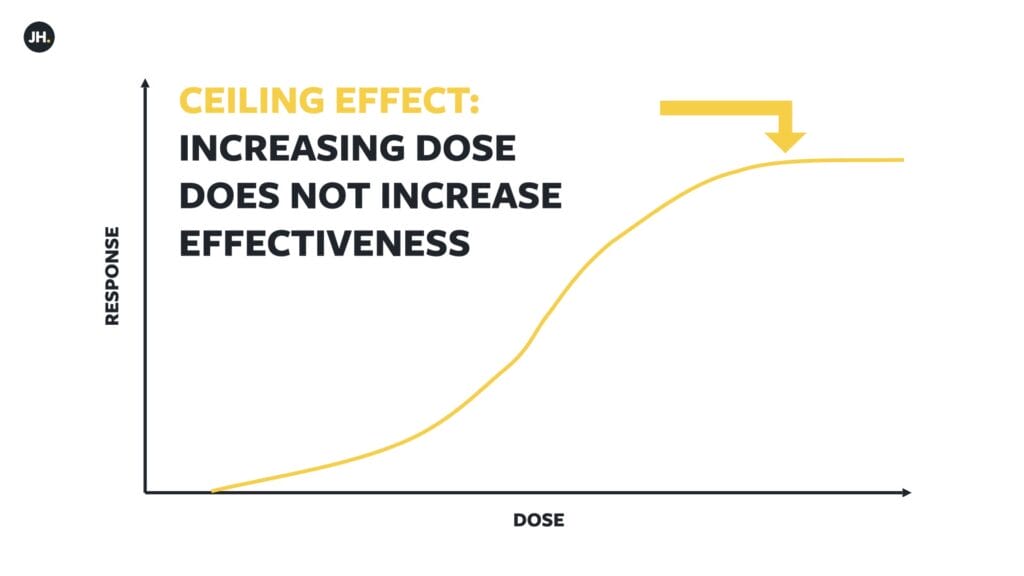
A chapter called ‘Evidence, Innovations & Implications’, in a book devoted to Nutrition for Brain Health & Cognitive Performance2 the authors describe how more than 30 claims related to nutrients enhancing specific cognitive functions have been rejected by regulatory bodies. There are several approved claims concerning nutrients, but these primarily relate to nutrients contributing to the maintenance of healthy function, rather than a boost.
Specific Diets & Cognitive Performance
There seems to be a lot of interest in the potential of specific dietary approaches yielding cognitive enhancing benefits. I’ve heard people talk about how their ‘brain fog’ lifted thanks to a carnivore diet, other people speak about the mental clarity associated with ketogenic diets, and some people suggest that their vegan diet has enabled them to boost their cognitive performance.
While I think anecdotes can be interesting and useful, from a scientific perspective, they are not a strong form of evidence. Unfortunately, the scientific research that does exist raises almost as many questions as it does answers about diet and cognitive performance.
A diet containing plenty of plant-based foods, oily fish, coupled with lower consumption of processed food, saturated fat, and simple sugars, appears to beneficial to cognitive health. However, more large-scale prospective studies, where individuals and, in this case, their diets and cognitive performance, are tracked over long periods, are required to provide stronger evidence3.
Plant-Based Diets
The idea of eating entirely plant-based diets seems to be growing in popularity due to ethical and environmental concerns. A recent film has also made some big claims about vegan diets and performance. However, the evidence doesn’t really support such strong assertions. A recent systematic review, which included the results of 32 human intervention studies investigating the impact of plant-based diets on both metabolism and cognition, concluded that it was not possible to establish the causal effect of plant-based diets on cognitive functions, mental and neurological health4. A vegan diet may improve cognitive performance. It’s also possible that it could be detrimental. In my view, based on the literature I’m familiar with, more research needs to be done before bold claims can be made, either way.
Ketogenic Diets
It doesn’t seem possible to spend more than 5 minutes in a gym without hearing someone spouting off about the benefits of a ketogenic diet for health, aesthetics and performance. I’m not in a position to judge the veracity of those claims as they relate to an individual. That’s to say, their anecdote may be true but, again, the scientific evidence is less bullish than your average changing-room expert.
Another recent study, featuring normal-weight participants in a randomised, controlled, crossover study, reports that three consecutive weeks of nutritional ketosis had no effect on cognitive function, sleep, or mood compared with a high-carbohydrate, low-fat diet in the healthy individuals who took part5.
Whatever Diet You Choose, Consider Your Food Choices Carefully
It’s important to mention again that neither of the two studies I referenced answer the broader question of whether either or neither of these diets ‘work’. The results are just another brick in our wall of knowledge.
Considering Nutrient Density
However, while it doesn’t seem that there is any singular ‘best way to eat’, some approaches likely make it easier and more efficient to get the nutrients we need. In the context of nutrients which are associated with supported claims for maintaining a healthy nervous system, brain, cognitive function, brain and cognitive development, and mental performance, animal products, such as meat fish and dairy, are very nutrient-dense. This doesn’t mean that you can’t get these nutrients from non-animal sources, and I’m not necessarily advocating eating or not eating animal products, but I think it is relevant to highlight what this nutrient density looks like in practice.
A water-soluble B vitamin called Biotin is important for healthy nervous system function. The UN Food and Agricultural Organisation and World Health Organisation recommend 30 micrograms a day of Biotin. If someone was to choose to eat animal products, they could achieve this daily intake by eating 3 cooked eggs. Alternatively, they could select a non-animal source of biotin, such as roasted almonds. However, they would need to eat around 700 grams of roasted almonds to hit the 30mcg target. I like almonds, so this isn’t necessarily out of the question. However, it is worth considering that in contrast to the three eggs, which equates to around 234 calories, 700 grams of almonds pack a whopping 3814 calories; significantly above the daily energy requirements for the average person.
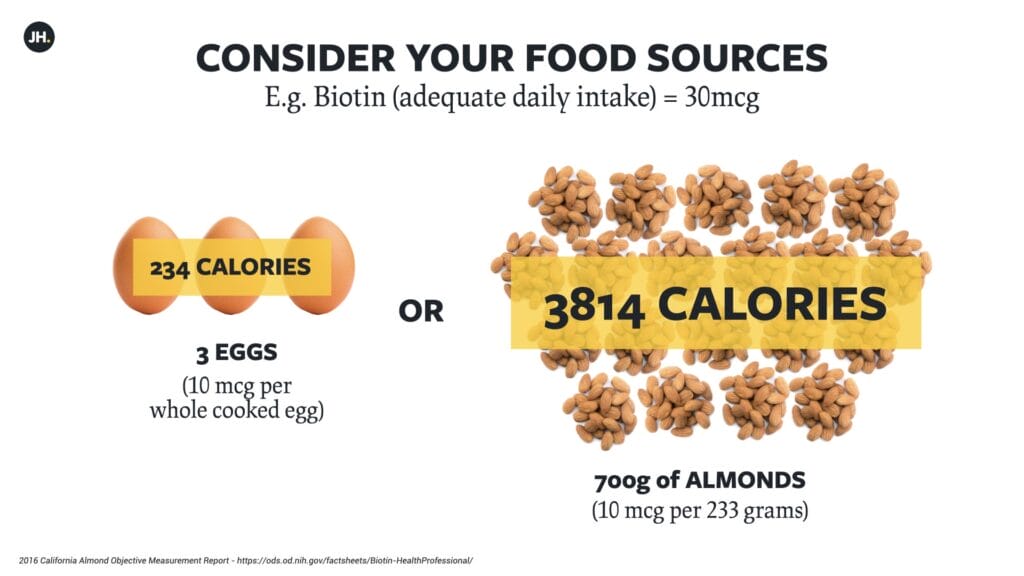
If someone chooses to adopt a plant-based diet, it makes sense that they pay extra attention not only to the nutrients in the foods they eat but also the density and availability of these nutrients, to ensure that they are consuming sufficient amounts for health and performance. This article provides some helpful recommendations for ensuring adequate nutrient intake for people who choose to remove animal products from their diet, based on a review of prospective, cross-sectional, and review articles.
No Consensus, But Still Monitor Your Nutrient Intake
While the scientific literature doesn’t exhibit a clear consensus in terms of advocating a specific diet, as I mentioned earlier, concerning approved health claims, it seems quite clear that certain nutrients play a crucial role in building and maintaining healthy brains, in terms of both physiology and function. In summary:
- Be critical of bold claims about particular nutrients, foods or diets providing immediate boosts to cognitive performance.
- Remember that more does not necessarily mean better in the context of nutrients and cognition.
- Whatever approach to eating you choose, pay attention to ensuring an adequate supply of nutrients for brain health and cognitive function.
References
- Li M, Shi Z. A Prospective Association of Nut Consumption with Cognitive Function in Chinese Adults Aged 55+ _ China Health and Nutrition Survey. J Nutr Heal Aging. 2019;23(2):211–216.
- Best, T. & Dye, L. (2015) Evidence, Innovations & Implications, in Best, T. & Dye, L. (eds.) Nutrition for Brain Health & Cognitive Performance. Taylor & Francis Group. Boca Raton. Florida. p. 347
- Cheung et al., (2014) B. Cheung, I. Ho, R. Chan, M. Sea, Woo J. Current evidence on dietary pattern and cognitive function. Adv. Food Nutr. Res., 71 (2014)
- Medawar E, Huhn S, Villringer A, Veronica Witte A. The effects of plant-based diets on the body and the brain: a systematic review. Transl Psychiatry [Internet]. 2019;9(1). Available from: https://dx.doi.org/10.1038/s41398-019-0552-0
- Iacovides S, Goble D, Paterson B, Meiring RM. Three consecutive weeks of nutritional ketosis has no effect on cognitive function, sleep, and mood compared with a high-carbohydrate, low-fat diet in healthy individuals: A randomized, crossover, controlled trial. Am J Clin Nutr. 2019;110(2):349–357
- Fields H, Ruddy B, Wallace MR, Shah A, Millstine D, Marks L. How to monitor and advise vegans to ensure adequate nutrient intake. J Am Osteopath Assoc. 2016;116(2):96–99

